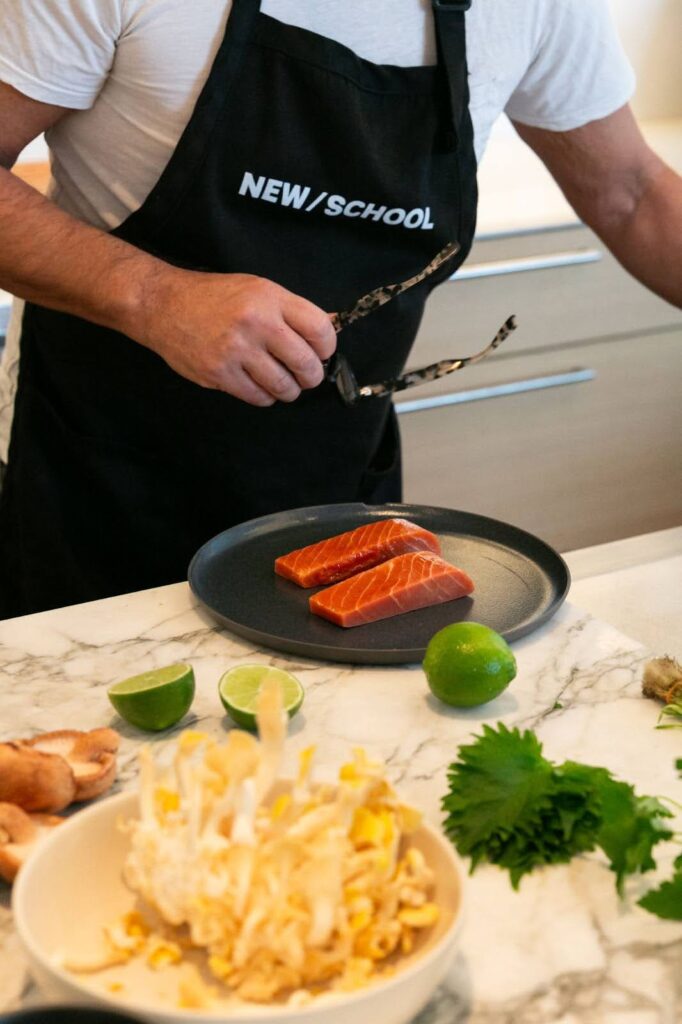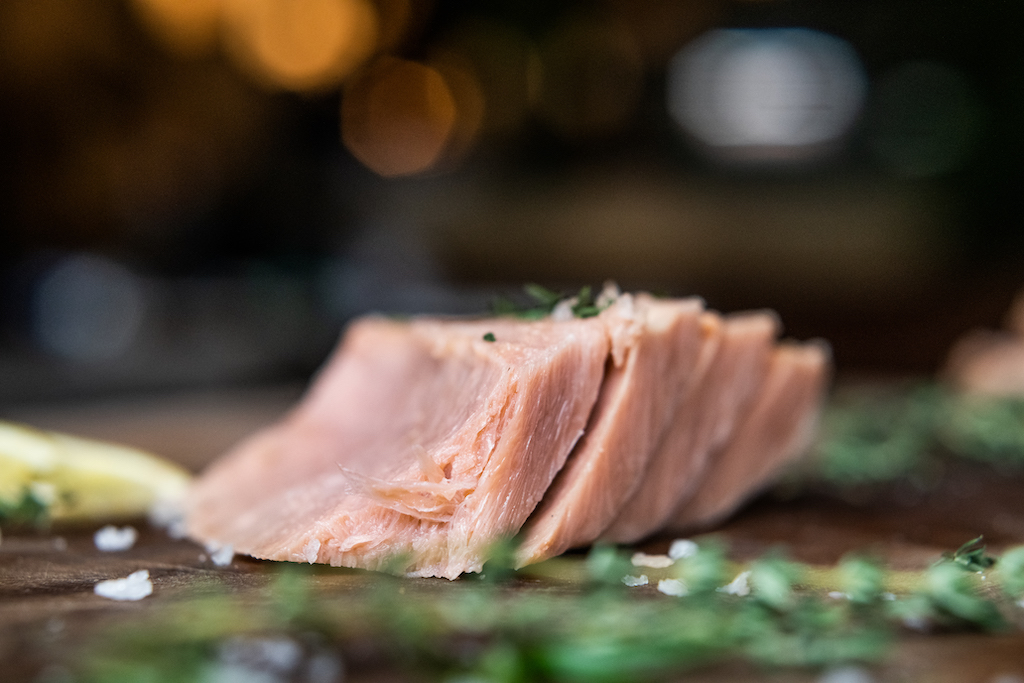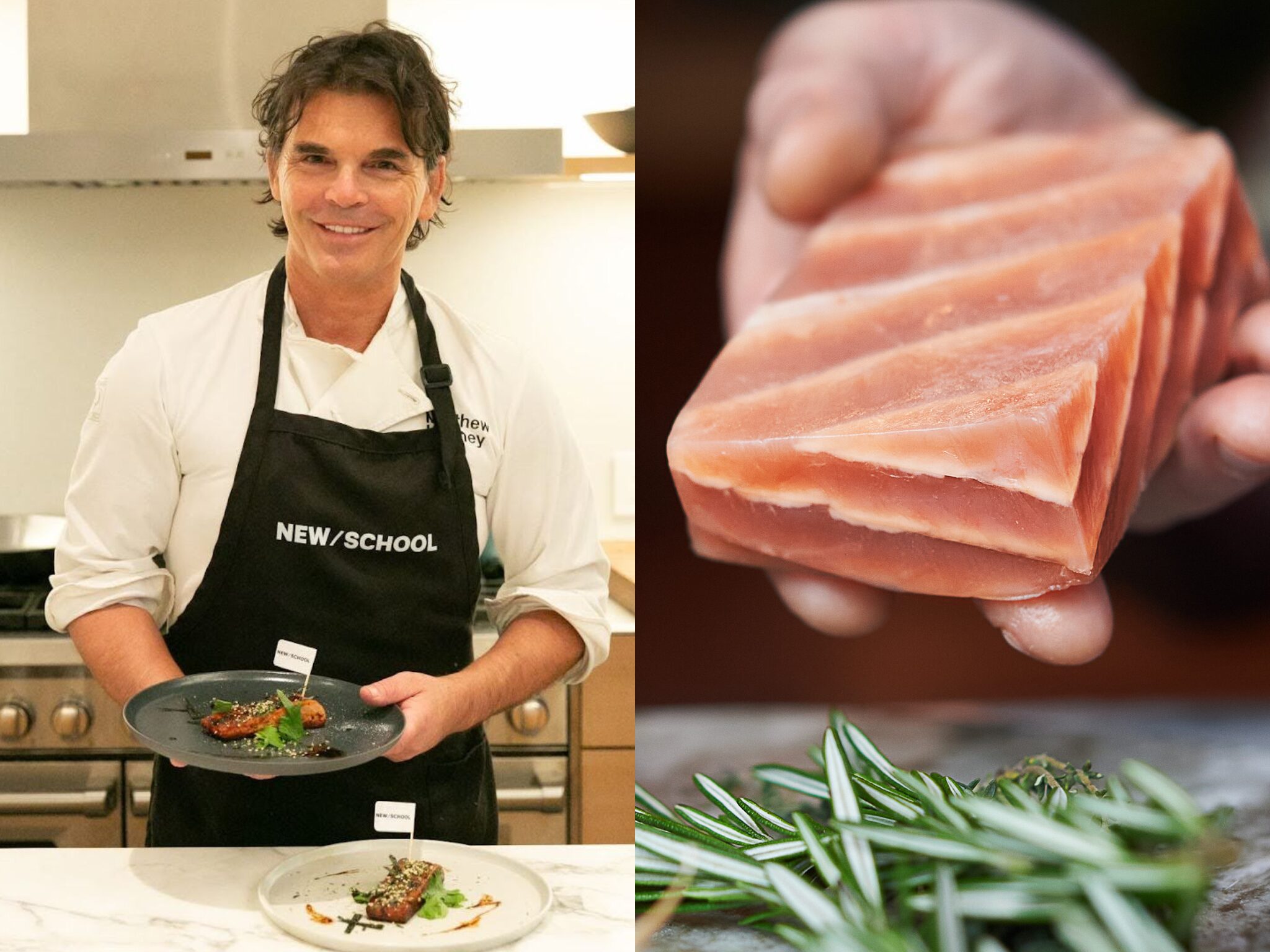New School Foods Ropes in Vegan Chef Matthew Kenney for ‘Culinary Council’ Ahead of Whole-Cut Salmon Launch
6 Mins Read
Canadian whole-cut plant-based salmon producer New School Foods has kicked off its New School Culinary Council of industry advisors, starting with vegan chef Matthew Kenney, who will help the brand make its commercial debut later this year.
New School Foods, which produces whole-cut wild salmon from plants, has collaborated with Matthew Kenney to launch the New School Culinary Council (NSCC), an invite-only collective of international chefs and restaurateurs. The advisory hub will help guide the company through its upcoming launch in restaurants.
Members of the NSCC will work closely with the Toronto-based startup to guide product development, recommend recipes, and support the adoption of its whole-muscle salmon. It reflects the company’s positioning of its seafood analogue as chef-led, with the use of plant fibres able to replicate the texture of fish muscle fibres, and recreate the same flavour, appearance and functional attributes.
“From Day 0, we developed this product with chefs in mind,” said New School Foods CEO Chris Bryson. “As tastemakers, chefs and restaurateurs sit at the intersection between product and consumer – they represent a critical piece of the puzzle when it comes to developing a product that consumers crave. If it won’t work for a chef, why would the consumer care?”
Kenney agreed, noting that “there is no more demanding audience” for plant-based meat than professional chefs: “If your product does not look, cook, and taste like the real thing, you are better off in the grocery store, because chefs will not compromise.”
Tapping into Matthew Kenney’s decades-long experience

The partnership will see Kenney develop new recipes with New School Foods’ salmon throughout the year, while highlighting menu flexibility and versatility of the whole-cut filet, which can be cooked in a host of different methods, including baking, roasting, sauteing, smoking and sous vide.
“He’s a true expert in plant-based foods and immediately understood our product – what it can do, and what it could do,” Bryson told Green Queen about the decision to team up with Kenney. “The first time he got the product, he took a series of filets and cooked them each in a different way, managing to take our product to whole new heights. He’s been extremely helpful at providing feedback for further improving the product, both in terms of the customer sensory experience, as well as the chef cooking experience.”
In addition, Kenney will serve as an advocate and consultant for New School Foods, leveraging his experience and network to secure foodservice listings for the vegan salmon, especially in Los Angeles, where he currently lives. He will also provide ongoing feedback during regular sessions with the product development team ahead of its planned launch later this year.
Kenney has been working in professional kitchens for over 30 years, with his company with dozens of restaurants around the world, including Plant Food + Wine, Plant City and Double Zero. A raw food pioneer, he was the founding partner of the infamous Pure Food and Wine vegan eatery in New York City, which was the subject of controversy in the 2010s after failing to pay its staff (Kenney left the establishment in 2005).
However, since September 2022, at least 12 of his restaurants have shut, and investors, landlords and employees have accused Kenney of non-payments, with some paychecks allegedly bouncing even as influencers were given $10,000 worth of free food every year for promoting the establishments. The chef has acknowledged that some checks may have bounced, but denies that influencers would have been given more than $1,000 worth of food.
To his credit, Kenney answered all questions asked of him in a wide-ranging interview with the Los Angeles Times – but the lawsuits and financial controversies give New School Foods pause when opting to work with him? “Not at all,” said Bryson. “We worked closely with chef Kenney for months before partnering, and his passion for both the product and the mission is clear. We believe that passion will carry over to many other chefs who will want to join New School Foods.”
Better-tasting alt-seafood products will win over consumers

New School Foods, which first unveiled its salmon in February 2023, expects to add more chefs to its NSCC. “We have been working with a series of chefs over the last year,” revealed Bryson. “Matthew is our first official member given his deep experience with the plant-based space.”
Adhering to the chef-forward philosophy, the company has no plans to sell its salmon in retail, instead focusing solely on restaurants. As for the pricing, Bryson said it will “depend on the relationship we have with each restaurant”.
New School Foods has also been working with precision fermentation startup Liven Proteins and dehydration solutions provider NuWave Research on an $11.4M project partly funded by the Canadian government, which will combine its salmon production tech with Liven’s animal-free collagen and NuWave Research’s vacuum microwave technology to manufacturer whole-muscle plant-based salmon at scale. “[The collaboration is] to support our core product development and bring it to market,” said Bryson. “Liven is doing some great work that we hope to include in future product versions.”
Its own version is made from a unique scaffolding technology that uses directional freezing to create scaffolds that mimic muscle fibres and connective tissues found in meat and fish. These are then infused with different proteins and flavours that mimic the taste, texture, structure and cooking process of conventional meat and seafood.
The news comes just shortly after San Francisco-based New Wave Foods and German startup Ordinary Seafood were forced to cease trading, highlighting the challenges facing the alternative seafood industry. Despite vegan seafood outpacing the plant-based meat sector in sales from 2021-22, its retail sales only hit $14M, a minuscule 1% of the $1.2B made by the overall meat analogues category. Its contribution to the overall seafood sector is even smaller, representing just 0.2% of total sales.
There have been some success stories too. Fellow Canadian Yves Potvin’s Konscious Foods has its frozen vegan sushi and poke bowl SKUs in over 4,500 retail doors in North America; Nestlé – the world’s largest CPG brand – introduced three plant-based seafood products in Europe and Asia recently; and Sweden’s Hooked Foods expanded into Germany with a listing in 400 REWE West stores in November.
“While the market is going through an adjustment period, long-term, we expect this will be a very exciting sector,” said Bryson. “Customers are still looking for alternatives, and that shows based on the plant-based sector’s growth in Europe and US foodservice. But the products need to be better – in taste, texture, cooking experience, and clear nutritional benefit over meat/seafood. That will require better ingredients, and better processing technologies to more closely meet customer expectations.”
“I speak from first-hand experience when I say that the products New School Foods developed are nothing short of a plant-based miracle,” said Kenney. “I was stunned by how versatile the product was – how it was a product that I could prepare any way I wanted. It cooks and transforms just like the real thing, raw-to-cooked transition and all, while delivering an amazing taste and texture experience.”
Israel’s Oshi and Austria’s Revo Foods also make whole-cut salmon – the latter was recently involved in a court case against the City of Vienna, which accused it of misleading consumers with its ‘vegan’ label on product packaging. The court has dismissed the suit.




